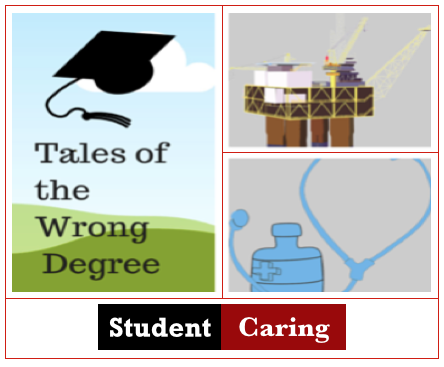In my senior year at high school, I realized my parents can’t support me in college — not my tuition or any of my expenses. It didn’t help that scholarships and financial aids here are limited. Even part-time jobs were out of my reach due to age restrictions. My time was running out, and no one was guiding me, so I chose the school and course that gave me the biggest scholarship option.
I convinced myself that it’s okay, even if I didn’t like the actual course or the school, as long as I didn’t have to pay for anything. I was dead wrong.
For years I, I felt haunted by my wrong decision. But after hearing stories of other students and alumni, I now realize this is a common problem that affects students of all backgrounds.
4 Lessons You Should Learn Now Before Regretting Your Chosen Major
1. What do You Want to be When You Grow Up?
- “I want to be president”
- “I want to be a scientist”
- “I want to be an actress”
- “I want to be a chef”
It’s probably one of the most useless questions we ask kids. When you were young, you probably had an idea of what you wanted to be. But how quickly did that career choice change?
Think you know what you want? Don’t be so sure. “I’ve already switched my major a handful of times,” says Aryana Jaleh, a junior at Community College of Aurora.
It’s a tough choice. No wonder about 20% to 50% of college freshman start off as ‘undeclared.’ So don’t feel pressured to choose a course right off the bat.
2. Don’t Rely on Popularity or Job Prospects Alone
Predicting a specific job market’s viability, four years after graduating college isn’t a foolproof way to ensure employment. Only about 40% of full-time college students graduate in four years, plus job markets are in a perpetual seesaw most times. In his book, Will College Pay Off: A Guide to the Most Important Financial Decision You’ll Ever Make, Peter Cappelli, uses this argument to warn against choosing a degree based on the popularity of a specific job.
Dental hygienist courses and physical therapy schools are getting tons of enrollees now. With the number of students pursuing the course, how can you be sure the demand projected now will still be there when you graduate?
For instance, petroleum engineering is hot right now. Years before it was a dead end market until oil fracking revived it. With the oil crisis in the Middle East, who’s to say what will happen next to the newly licensed petroleum engineers?
3. Apply the Process of Elimination
Jaleh, the junior college student mentioned earlier, entered college with an eye towards acting. After the first semester, she realized acting was more time consuming than expected, so she switched her focus to graphic design.
But that wasn’t her final path. “When I transferred to a university, the school I chose didn’t have a graphic design major, plus I wanted to try something new, so I majored in communications,” she says.
She liked it at first, but eventually realized that she preferred visual arts, which isn’t the focus of a major in communications. “At this point, I’m already graduating six months late, so I’m sticking with it.”
You might think she’s indecisive, but this scenario is more common that you realize. Many students aren’t even as lucky — or as persistent — as she is. Some just call it quits, concluding college isn’t for them.
What did she learn from all that switching? What’s the lesson here? “Begin as undeclared and take completely unrelated classes in completely unrelated fields before declaring something. That way, you’ll at least know what you DON’T want to do,” she says.
4. Accept that Some Fields of Study have Limited Career Options
“I have a BA in Psychology, and a Master’s of Theological Studies Degree. Neither trained me for a paying job in the real world,” says David Bennett, a high-school Theology teacher turned author and entrepreneur. “Both degrees were very interesting, but now that I’m $40,000 in debt and 37 years old, I realized that I went down the wrong path,” he adds.
Like other graduates with liberal degrees, he’s finding it impossible to switch jobs. “There are so many people with theology degrees, and so few jobs available,” adds Bennett. People who went to music school are in the same boat, like my father is. It’s hard for them to find job options besides teaching.
His story is just one of many out there, so don’t just choose a course you’re interested in then hope for the best.
The Common Lesson for Everyone
There’s no one size fits all advice here, and that’s true both in your choice of school and career. Student loan debt, regret and lack of employment opportunities, however, are tangible problems that affect everyone. So keep those things in mind when you choose your course.
Consider your financial situation but don’t let it be your only deciding factor. Major in something that interests you, but also has decent selection of jobs.
Author Bio:
Charley Mendoza is a freelance writer covering business, personal development, and careers. You can find out more about her work on freelancewritercharley.com. Follow her on Twitter on @CharleyWrites.
We welcome your feedback to our work.
Email: General Information | Dr. Daniel de Roulet | Prof. David C. Pecoraro
Thank you!
Daniel & David
###
Tales of the Wrong Degree: Lessons from Students Who Chose the Wrong College Degree


0 Comments